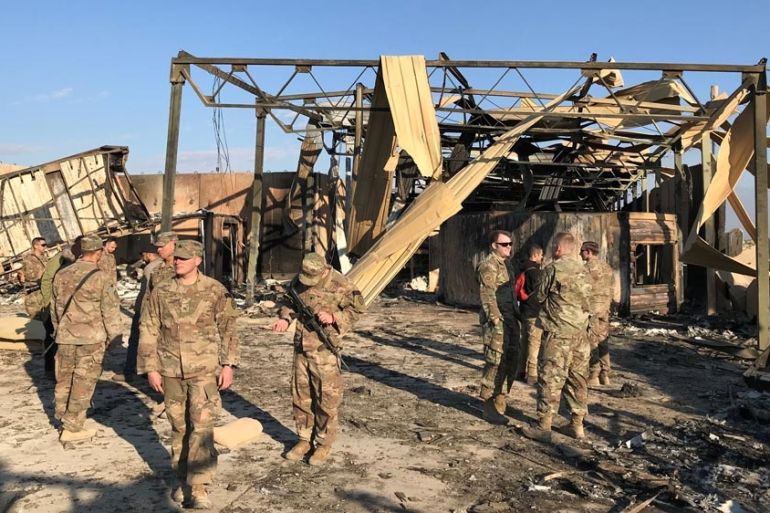US Senate poised to rebuke Trump on Iran
After Soleimani strike, war powers resolution would seek to limit Trump from escalating military conflicts with Iran.

Washington, DC – The United States Senate is prepared to rebuke President Donald Trump over escalating military tensions with Iran following the US killing of Iranian General Qassem Soleimani last month.
Driven by concern over the assassination of Soleimani and retaliatory Iranian attacks on US troops in Iraq, the Senate is expected to vote on Thursday on a resolution that would require Trump to get congressional approval before engaging in further military action against Iran.
Keep reading
list of 3 itemsSenate Democrats say measure to rein in Trump on Iran will pass
US-Iran tensions: What war powers does Trump have?
Sponsored by Democrats with support from a significant number of Republicans, the pending measure sends a warning to Trump that a majority in the US Congress want to avoid war with Iran.
“There is strong bipartisan support for the simple proposition that the nation should not be at war without a vote of Congress,” Democratic Senator Tim Kaine told reporters at the Capitol on Wednesday.
“We are still at a very challenging moment in the US Iran relationship,” Kaine said.
“Hopefully, we are stepping back,” he added. “If we decide to go to war we should do it based upon careful deliberation.”
Trump ordered the attack that killed Soleimani, the head of Iran’s elite Quds Force, at the airport in Baghdad on January 3. Conflict with Iran swiftly escalated into a standoff many members of the US Congress feared would lead to outright war.
Iran responded to Soleimani’s killing with attacks on two Iraqi bases housing US troops. More than 100 US troops were diagnosed with traumatic brain injuries.
Republican support, opposition
Under the War Powers Act of 1973, the Senate resolution directs the removal of US forces from hostilities against Iran that have not been authorised by Congress.
The measure is likely to be approved by the House of Representatives but Trump has threatened to veto the measure. Two-thirds votes in the House and Senate would be needed to override a veto.
Most Senate Republicans are expected to oppose the resolution which they see as a Democratic “effort to broadcast a political message”, Republican leader Mitch McConnell said in floor remarks on Wednesday.
“If my colleagues want to make a real difference this is not the way to do it,” McConnell said.
Tensions with Iran have escalated over the past two years after Trump unilaterally pulled the United States out of the 2015 nuclear agreement with Iran.
Since 2018, Trump has exerted a “maximum pressure campaign” against Iran, including economic sanctions, diplomatic isolation and military threats.
Trump tweeted on Wednesday that the Senate resolution would tie his hands in dealing with Iran and weaken the US position in the region.
“It is very important for our Country’s SECURITY that the United States Senate not vote for the Iran War Powers Resolution,” Trump tweeted.
It is very important for our Country’s SECURITY that the United States Senate not vote for the Iran War Powers Resolution. We are doing very well with Iran and this is not the time to show weakness. Americans overwhelmingly support our attack on terrorist Soleimani….
— Donald J. Trump (@realDonaldTrump) February 12, 2020
Eight Republican senators, however, voted with Democrats on a procedural motion to advance the resolution on Wednesday.
“The resolution is much needed and it is long overdue,” said Republican Senator Susan Collins.
“Over the past decade, Congress has too often abdicated its constitutional responsibility on authorizing the sustained use of military force,” Collins said.
Anti-war sentiment
Anti-war sentiment has been rising in Congress as US troops remain mired in conflicts in Afghanistan, Iraq and Syria with little progress to show for the effort. Trump himself has repeatedly said he wants to end “America’s wars in the Middle East”.
“Look at the situation we face today; almost 5,000 American deaths in the war in Iraq,” said Democratic Senator Richard Durbin.
“We found no weapons of mass destruction. We enhanced, unfortunately, the image of Iran in the region. It appears that many of the Iraqi leaders would like to see us leave after 18 years of conflict,” Durbin said.
The US air attack on Soleimani on Iraqi soil sparked public demands in Iraq for US troops to leave.
|
|
The Democratic-led US House of Representatives voted on January 30 to approve two measures aimed at constraining Trump’s ability to direct military action in the Middle East.
A bill that would block funding for any use of offensive force against Iran passed by a 228-175 vote. A second measure, repealing Congress’s 2002 authorisation of the US invasion of Iraq passed 236-166.
The House also voted 224-194 on January 9 to rebuke Trump for the killing of Soleimani.
Representative Steny Hoyer, the number two House Democrat, said the House will vote on the Senate bill if it passes.
Trump administration officials have offered shifting justifications for the drone strike that killed Soleimani and three others in a car at the Baghdad airport. They initially said Soleimani was planning imminent attacks on US troops and sites, but have only offered vague details.